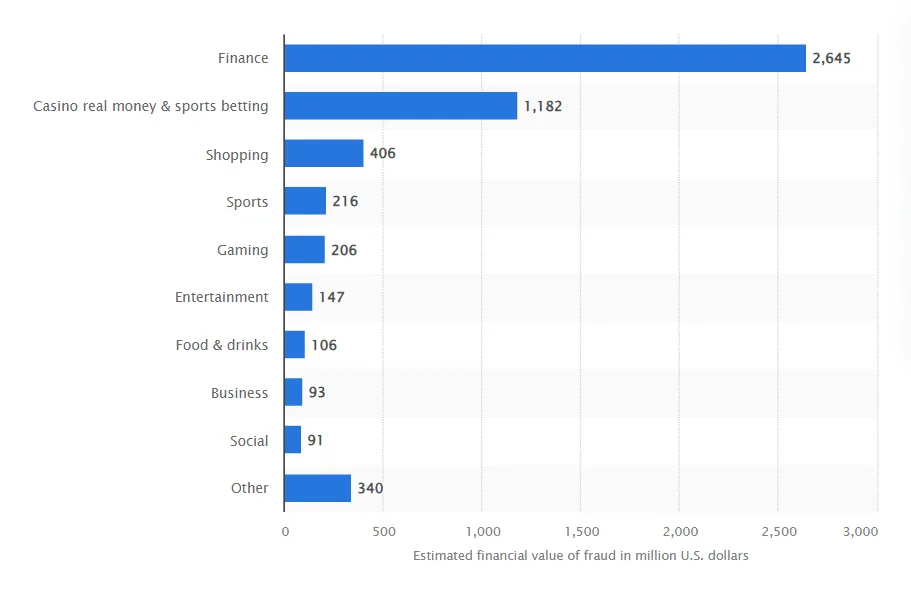The video game industry is a major economic force, with revenues reaching nearly $347 billion globally in 2022. By 2029, the market is set to reach a new high of $666 billion. As technology evolves, innovations like cloud gaming and virtual reality (VR) transform how games are developed and enjoyed, making the gaming world more immersive and dynamic than ever [1].
However, with this success comes a darker side. As the industry grows, so do the opportunities for scammers to exploit players and developers. Scams like fake in-game purchases and phishing schemes are becoming more common, putting both individuals and the gaming community at risk. Between January 2022 and February 2023, gaming scams have caused losses of $216 million U.S. dollars [2].
 Figure 1: Estimated loss value of mobile fraud worldwide in U.S. dollars.
Figure 1: Estimated loss value of mobile fraud worldwide in U.S. dollars.
Recent studies show that younger gamers are especially vulnerable to gaming scams, with identity theft (67%) and hacking (61%) being the most common forms of fraud affecting this age group through gaming, according to a Lloyds Bank report [5].
This article will explain some common gaming scams, how they work, and how you can protect yourself and your children from these threats.
Common Types of Online Gaming Fraud
Fraudsters use a variety of deceptive methods to exploit online gaming platforms [3][4][5][6], like:
- Account Takeover (ATO): Fraudsters trick players into revealing their login details or exploit weak security systems to hijack accounts. Once they gain control, they can steal in-game items or sell the accounts for real money.
- Phishing Scams: Scammers send fake emails or DMs posing as official game communications. These deceptive messages might offer free in-game items or exclusive content to trick players into entering their login credentials on fraudulent websites
- Payment Fraud: This scam involves using stolen credit card information or compromised accounts to make unauthorized purchases for in-game items. The financial losses from these fraudulent transactions can impact both players and game developers.
- Chargeback Fraud: Players make legitimate in-game purchases and then falsely claim that these transactions were unauthorized to get their money back. This leads to financial losses for developers due to lost revenue and transaction fees.
- Virtual Item Scams: Scammers advertise fake in-game items or currency through unofficial channels. Players pay real money for these items but end up receiving nothing or worthless substitutes.
- Match Manipulation: Scammers cheat by changing the results of matches, teaming up with others unfairly, or using game glitches. These actions ruin fair play and hurt the integrity of the game.
- Botting: Scammers use bots to quickly level up accounts and gather items to sell for real money. This gives them an unfair advantage and spoils the game for genuine players.
- Fake Currency Generators: Scammers offer to provide free in-game currency in exchange for actions like clicking on ads. These ads often contain malware designed to capture login information.
Gaming Scam Case in Singapore:
In a recent scam targeting game account sellers in Singapore, victims have been tricked into paying administrative fees via fake online platforms. Since February 2022, at least 21 victims have collectively lost $86,000. The scammers approach their targets on gaming or e-commerce platforms, expressing interest in purchasing the victims’ gaming accounts and providing dubious URLs (e.g., 91.73299.cn, 93.57751.cn, uyagsdusa4.wpg7mmci3k.lol) to seemingly reliable platforms for account sales.
 Figure 2: A screenshot of a fraudulent site that sells gaming accounts.
Figure 2: A screenshot of a fraudulent site that sells gaming accounts.
Victims are then prompted to create an account using their bank details, name, and contact number. The scammers claim that payment has been made, but victims are unable to withdraw the money and are directed to fake customer service representatives, who instruct them to deposit more money to unfreeze the funds. Victims realize they have been scammed when they cannot withdraw any funds [7].
How to Protect Yourself and Your Family from Online Gaming Scams :
Online gaming can be fun, but it’s important to stay safe. Here’s how to protect yourself and your family from gaming scams [3]:
-
- Learn about common scams and explain them to your family. Don’t share personal or financial details with strangers, and be wary of deals that seem too good to be true.
- Don’t trust unexpected messages or offers, especially those promising free items or currency. Verify the offer before clicking any links or sharing information.
- Ensure websites and offers are legitimate before making purchases or sharing details. Look for secure websites (with “https” in the URL) and verify the source.
- Don’t click on strange links or download unknown apps. They might be scams or malware.
- Enable two-factor authentication for your gaming and important accounts for added security.
- Check and adjust the privacy settings on your children’s gaming accounts. Ensure settings are age-appropriate, and consider turning off in-game chat if needed.
- Monitor your children’s in-game purchases to ensure they are legitimate and that they aren’t spending money without permission.
- Create strong, unique passwords for each account. Use a password manager if needed, and change passwords if you suspect a breach.
- Install antivirus software, use a VPN, and regularly check your bank statements for suspicious activity. Consider identity theft protection.
- By following these steps, you can enjoy a safer gaming experience.
Social Media Protection with Eydle
With the gaming industry booming, scammers are also on the rise, targeting gaming companies and young players online. Safeguard your business’s online presence with Eydle. Our team of experts, including AI leaders from MIT, Stanford, and Carnegie Mellon, offers advanced technologies to protect against online threats. Our solutions help protect your business from impersonation attempts. Find out more about Eydle’s services at www.eydle.com or email us at [email protected].
Sources:
- https://www.statista.com/statistics/1344668/revenue-video-game-worldwide/
- https://www.statista.com/statistics/1380417/app-fraud-value-by-category/
- https://www.forbes.com/sites/forbestechcouncil/2024/01/29/what-you-need-to-know-about-gaming-scams-targeting-children/
- https://www.biometricupdate.com/202406/understanding-and-combating-online-gaming-fraud.
- https://www.experian.com/blogs/insights/online-gaming-fraud/
- https://shield.com/blog/3-types-of-fraud-on-gaming-apps
- https://www.police.gov.sg/media-room/news/20221125_police_advisory_on_fake_online_platforms_selling_gaming_accounts




